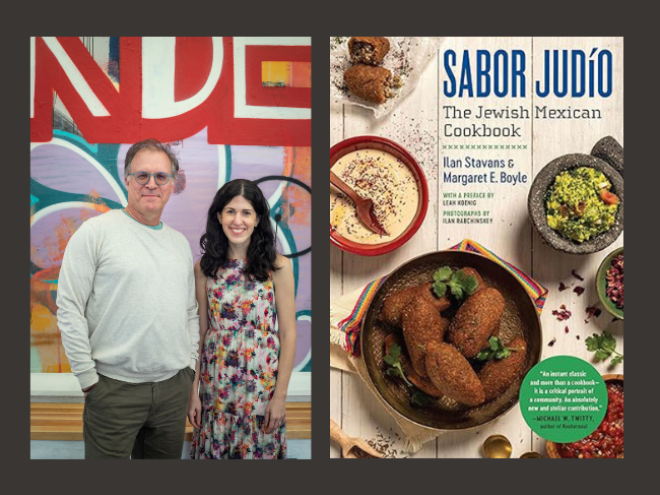When Ilan Stavans and Margaret E. Boyle realized that they inherited similar recipe books from their Mexican Jewish grandmothers and great-grandmothers, they realized they had something special on their hands. Both were notebooks with recipes written in Yiddish, sprinkled with Hebrew, and full of comments in Spanish — and both combined traditional Jewish dishes with ingredients typical of Mexican cuisine.
Comparing the dishes from the recipe books that they most enjoyed in their childhoods, they discovered that challah French toast with cajeta (a caramel sauce made from milk), falafel taquitos, and matzo ball soup with caldo verde were not merely isolated inventions of their grandmothers, but meals that had become commonplace in the homes of the Mexican Jewish comunidad.
These are dishes that fuse Mexican cuisine — rooted in Indigenous, Mestizo, and Afro-Mexican civilizations — with traditional Jewish cuisine, brought over by Ashkenazi and Sephardic families over the course of various migration waves during the nineteenth and twentieth centuries.
Stavans, a writer and cultural critic, and Boyle, a Latin American studies specialist, began to wonder whether it was possible to talk about a distinct and authentic Mexican Jewish cuisine. Driven by the need to find other recipes like theirs, they set out in search of “sabores judíos,” or Jewish flavors.
Their new book, Sabor Judío, is a compilation of these recipes and their stories. Each is accompanied by a commentary explaining which Jewish migration wave brought the dish, in which family’s kitchen it emerged, how it evolved over the generations, and why it uses particular ingredients. The authors also describe the rituals — and myths — surrounding the dishes.
Recipes include a Jugo de la Fertilidad (“fertility juice”) made from beets and carrots, which some families in the community believe has magical powers; a “Wish on a Star Soup” capable of curing colds and other ailments; and a range of other dishes, from stuffed eggplant with saucy “Yiddish cheese,” to borscht con crema, to chicken kreplach soup with tomatillo.
The book is organized by meals—desayuno, almuerzo, cena, and sobremesa (the time after a meal when conversation stretches on for hours). At the end, there’s a section dedicated to Jewish holidays. For Passover, matzo is spread with spicy sauces, guacamole, and pico de gallo. For Shabbat, a cactus-and-tomato salad can be easily prepared before sundown on Friday and enjoyed during Saturday lunch.
In addition to recipes from family cookbooks, Sabor Judío also includes recipes from important, sometimes surprising figures in Mexican history (including Frida Kahlo) and prominent contemporary creatives such as chef Pati Jinich, journalist Myriam Moscona, and writer Angelina Muñiz-Huberman.
Jews have always been a diasporic people, and our cuisine is no different; it’s marked by fusions of languages, flavors, and ingredients from new neighbors and lands. The dishes included in this special volume reflect the ways our culture and traditions constantly adapt and evolve, transformed through contact with others.
Jessica Ruetter is a writer and the founder of Bibliofilia, an online platform dedicated to Spanish-language literature. Through interviews with Latin American authors and book recommendations, she connects readers across the Hispanic world. She recently graduated from Universidad Torcuato Di Tella in Buenos Aires, Argentina.





